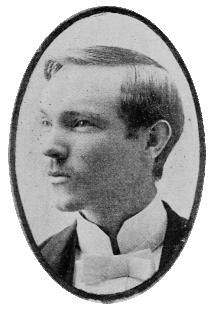Charles Harvey Bollman (1868–1889) was an American naturalist who published on fishes and myriapods, becoming known internationally for his work in a short career before dying at the age of 20, considered by David Starr Jordan one of the most brilliant and promising naturalists he had ever known.[1]
Charles Harvey Bollman | |
|---|---|
 | |
| Born | December 24, 1868 |
| Died | July 13, 1889 (aged 20) |
| Education | Indiana University Bloomington |
| Known for | Studies on fishes and myriapods |
| Scientific career | |
| Fields | Biology |
| Institutions | U.S. Fish Commission |
| Academic advisors | |
Bollman was born in Monongahela, Pennsylvania, December 24, 1868. He attended the Indiana University at Bloomington where he studied under John C. Branner[2] and David Starr Jordan. Bollman was a founding member of the university's Independent Literary Society.[3] He graduated in June 1889 and was appointed immediately after as an assistant in the United States Fish Commission, and died of dysentery contracted while collecting fish in the Okefenokee Swamp of Waycross, Georgia, on July 13.[4][5] He was the only 19th-century ichthyologist to enter the Okefenokee.[6]
Bollman published thirteen papers between the years of 1887 and 1889, including papers co-authored with Jordan. Of myriapods, he described 65 new species in North America.[7] J. S. Kingsley considered him "one of our best students of the Myriapoda",[8] and he was considered by biologist Ralph Crabill "the most brilliant chilopod systematist of this country in the 19th century".[9] His collection of myriapods is housed in the National Museum of Natural History.[10]
He was posthumously commemorated by Jordan in the name of the goby genus Bollmannia,[11] by C. H. Gilbert in the fish Opsopoeodus bollmani,[12] and by Filippo Silvestri, who named the millipede genus Bollmania.[13]
See also
editReferences
edit- ^ Riley, C. V. "Introductory note". in: Bollman, Charles Harvey (1893). "The Myriapoda of North America". Bulletin of the United States National Museum (46): 7.
- ^ Evermann, Barton Warren (1917). "A century of zoology in Indiana, 1816-1916". Proceedings of the Indiana Academy of Science. 26: 221–222.
- ^ Livengood, W. W. (1908). Independent Literary Society of Indiana University. Bloomington, Indiana.
- ^ Eigenmann, C. H. (1890). "Charles Harvey Bollman". The West American Scientist. 7 (50): 5–6.
- ^ Rathbun, Richard (1892). "Report upon the inquiry respecting food-fishes and the fishing grounds". Report of the Commissioner of Fish and Fisheries for 1888. Washington: United States Bureau of Fisheries. p. LXXIV.
- ^ Laerm, Joshua; Freeman, B. J. (2008). Fishes of the Okefenokee Swamp. University of Georgia Press. p. 17. ISBN 978-0-8203-3135-5.
- ^ "News and notes". Science. 22 (564): 293–294. 1893. JSTOR 1766701.
- ^ Kingsley, J.S. (1894). "The classification of the Arthropoda (continued)". The American Naturalist. 28 (327): 220–235. doi:10.1086/275894. S2CID 85414194.
- ^ Crabill, Ralph Edwin (1952). The Centipedes of Northeastern North America. Cornell University. p. 10.
- ^ "Smithsonian Institution's Department of Entomology". Bulletin of the Entomological Society of America. 9 (4): 273–277. 1963. doi:10.1093/besa/9.4.273.
- ^ Jordan, David Starr; Bollman, Charles Harvey (1890). "Descriptions of new species of fishes collected at the Galapagos Islands and along the coast of the United States of Colombia, 1887-88, by the U.S. Fish Commission steamer 'Albatross'". Proceedings of the United States National Museum. 12 (770): 164. doi:10.5479/si.00963801.12-770.149.
- ^ Jordan, David Starr; Evermann, Barton Warren (1896). The Fishes of North and Middle America. U.S. Government Printing Office. p. 249.
- ^ Silvestri, Filippo (1896). "I Diplopodi". Annali del Museo Civico di Storia Naturale di Genova. 2. 36: 150.
External links
edit- Media related to Charles Harvey Bollman at Wikimedia Commons
- Works by or about Charles Harvey Bollman at Wikisource
- Works by or about Charles Harvey Bollman at the Internet Archive